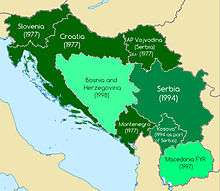LGBT history in Yugoslavia
Homosexuality in Yugoslavia was firstly decriminalized in the Socialist Republics of Croatia, Slovenia, Montenegro and Socialist Autonomous Province of Vojvodina in 1977.[1]
| 1918–1992 | |
 1977 decriminalization of homosexuality in Yugoslavia | |
| Preceded by | |
|---|---|
| Followed by |
|
Kingdom of Yugoslavia
In 1937 Belgrade based daily newspaper Politika published news about a young man from Central Serbia who arrived in Belgrade with his brothers to change his gender.[2]
World War II
Independent State of Croatia
In the Nazi Germany puppet state Independent State of Croatia, homosexuals were persecuted and sent to concentration camps, such as Jasenovac. Croatian author Ilija Jakovljević in his text Konclogor na Savi (English: Concentration Camp on Sava) mentioned that in prison on Square N16 in Zagreb (modern day Square of the Victims of Fascism) he met a "lover of the male body".[3]
National Liberation War 1941-1945
There are sources about homosexual Yugoslav Partisans during World War II in Yugoslavia. Milovan Đilas in his war memoirs tells the story from Sandžak where one Muslim soldier was exposed as homosexual by other soldiers and the Regional Secretary, Rifat Burdžović.[4] The Regional Secretary in doubt asked Đilas if he should "execute [the] freak?", while Đilas remained in doubt admitting that at the time he neither knew Communist Party of Yugoslavia practice nor anything said on such matters by Marx and Lenin.[4] At the end he concluded that "from such vices suffer proletarians, and not only bourgeois decadent" but that he can not have functions or be a party member.[4] Đilas said that he only later learned that "that homosexual, who in appearance was sheer manhood, was very brave and courageously fell in battle".[4][5]
Communist Yugoslavia
Postwar persecution
In postwar period there were more examples of persecution and inhumane treatment of homosexual individuals. One of cases took place in Dubrovnik where members of Communist Party in 1952 arrested homosexuals, put bags with pejorative inscriptions on their heads and led them through the city.[6] In 1959 homosexuality was officially criminalized in Yugoslavia.[4]
Liberalization in the 70s
In 1973, the Croatian Medical Chamber removed homosexuality from the list of mental disorders.[4] In 1974 a law professor at the University of Ljubljana, Ljubo Bavcon, urged the decriminalization of homosexuality as one of the members of the Commission for the Adoption of Criminal Law of the Socialist Republic of Slovenia.[4] First federal subjects that decriminalized homosexuality were the Socialist Republics of Croatia, Slovenia, Montenegro and Socialist Autonomous Province of Vojvodina in 1977.[1] Other parts of the Federation will make this move only after the collapse of Yugoslavia. Serbia (excluding Vojvodina) in 1994, Macedonia in 1997 and finally Bosnia and Herzegovina (both Federation of Bosnia and Herzegovina and Republika Srpska) in 1998.[4]
LGBT activism
The first six-day long festival of gay culture in Yugoslavia was organized in April 1984 in Ljubljana.[7] In the same year, the first gay organization Magnus was founded in Ljubljana and in 1987, the first lesbian organisation was founded LL (Lezbijska Lilit).[7] The first regular radio broadcast that, amongst other marginalized groups, dealt with gay issues were the 1985 Zagreb based Frigidna utičnica (English: Frigid Socket) whose host Toni Marošević was openly gay.[3] Because of disapproval from Večernji list and the Večernje novosti program, it was quickly removed from the station programming.[3] In its 1986 proclamation, the organization Magnus demanded the introduction of prohibition of discrimination based on sexual orientation in the Yugoslav Constitution, decriminalization of homosexuality in the whole of Yugoslavia, the introduction of curriculum that would present homosexuality and heterosexuality on equal terms & demanded a protest of the Federal Government of Yugoslavia against Socialist Republic of Romania, Soviet Union, Iran and other countries where homosexuality was still criminalized at that time.[7] In 1990 in Hotel Moskva in Belgrade, which was a popular gay gathering place in the 1970s, one gay and lesbian group began to organize meetings and in January 1991 they founded the organization Arkadija.[3]
LGBT topics in pop culture
Music
In the second half of the 1970s first songs that deal with issues of lesbian and gay population appear.[8] They were very different in genre, from rock, post-punk, electropop to the traditional folk music.[8] Some of the most popular songs with LGBT themes are "Neki dječaci" sung by Prljavo kazalište, 1982 song "Moja prijateljica" sung by Xenia, "Preživjeti" sung by KUD Idijoti, 1974 song "Ramo, Ramo" sung by Muharem Serbezovski, 1980 song "Retko te viđam sa devojkama" sung by Idoli, song "Javi mi" sung by Zabranjeno Pušenje and song "Balada o čvrstim grudima" sung by Šarlo Akrobata.[8]
See also
- LGBT history in Bosnia and Herzegovina
- LGBT history in Croatia
- LGBT history in the Republic of Macedonia
- LGBT history in Montenegro
- LGBT history in Serbia
- LGBT history in Slovenia
- LGBT history in Kosovo
References
- L. Grubić-Radakovi. "Seksualna delinkvencija u suvremenom krivičnom pravu" (PDF) (in Serbo-Croatian). Retrieved 13 April 2014.
- Centar za kvir studije. "Politika: Promena pola 1937. godine" (in Serbian). Retrieved 23 April 2014.
- Spahić and Gavrić, Aida and Saša (2012). Čitanka LGBT ljudskih prava, 2. dopunjeno izdanje (PDF) (in Serbo-Croatian). Sarajevo: Sarajevski otvoreni centar/Heinrich Böll Foundation. ISBN 978-9958-577-02-4. Retrieved April 23, 2014.
- "LGBT PRAVA U SFRJ" (in Serbo-Croatian). Archived from the original on 26 April 2018. Retrieved 13 April 2014.
- J. Batini ́c, Women and yugoslav partisans: A history of world war ii resistance, Cambridge University Press, 2015.
- Jutarnji list. "Muškarci su se voljeli i u vrijeme Tita" (in Croatian). Retrieved 14 April 2014.
- "TOPLA BRAĆA, HVALA NE! HISTORIJA SLOVENSKOG GEJ I LEZBEJSKOG POKRETA" (in Bosnian). Retrieved 14 April 2014.
- labris.org. "LGBT pjesme sa prostora bivše Jugoslavije (i neke kasnije)" (in Serbian). Archived from the original on 2 April 2015. Retrieved 20 March 2015.
